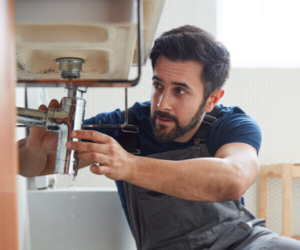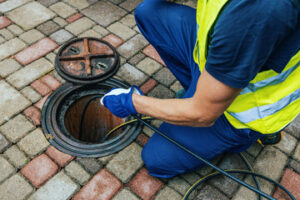The plumbing industry may not be top of mind when considering noble professions, but it should be. We owe a lot to plumbers—without them, showers would be cold and baths rare. Contact Plumbers In Lexington now!
They’re the ones who install pipes, fixtures and other equipment used to distribute fresh water and eliminate waste in homes, businesses, and factories. They’re also on call to respond to plumbing emergencies.

Plumbing systems are made up of pipes, fixtures and appliances that facilitate the distribution of water and waste in residential, commercial and industrial settings. Plumbers install and repair these components to ensure that a building’s water supply is safe, sanitary and adequate for use and that sewage and waste are efficiently disposed of. These professionals also have the skills and knowledge to work with gas systems, heat pumps and hot water heaters.
Installation plumbers work on new construction projects to install piping and fixtures such as sinks, toilets, tubs and showers. They follow blueprints and building codes to ensure that all fixtures are placed correctly and connected properly. They may also be responsible for installing sprinkler and irrigation systems. Apprenticeships or trade school programs are typically required for those wishing to become licensed plumbers.
Plumbers are also responsible for repairing and maintaining existing piping and plumbing fixtures and appliances. They diagnose problems such as leaks, clogs and broken components and use their problem-solving skills to find effective solutions. This can include utilizing specialized tools such as augers and snakes to unclog drains. They also utilize their customer service skills to provide advice and estimates on cost for repairs.
Emergency plumbing services are another component of this skilled trade. This involves responding to calls from customers to fix leaking pipes, overflowing toilets and other urgent issues. This can require after-hours calls and overtime pay.
Plumbers also have the option of working as self-employed contractors or running their own plumbing businesses. This requires a high level of business and financial management, as well as the ability to source materials and manage staff. Plumbers must also be comfortable with a certain amount of risk and uncertainty, as they are often called upon to work in cramped spaces and potentially dangerous conditions.
Soft skills are also important for plumbers, including communication and teamwork. They must be able to interact with clients effectively to understand their needs and concerns, and explain complex plumbing issues clearly and concisely. This is particularly vital when collaborating with other tradespeople on larger project teams.
Plumbing systems are complex networks of pipes that supply water, remove waste and regulate indoor climate. Plumbers install and repair these systems in residential, commercial and industrial settings. Their work involves a wide range of tasks including inspecting pipes for damage or leaks, testing pressure levels and fitting new fixtures like faucets, toilets, tubs and showers. Other responsibilities include connecting gas appliances and draining waste and septic systems. Plumbers must also have the skills to read and interpret blueprints and building codes.
Some plumbers specialize in specific areas of the field. For example, some may only work on hot water systems while others focus on sewage and drainage. The specific duties of these experts vary but typically involve working with the same tools and equipment as their colleagues.
Plumbers are in demand across the country because of their unique set of skills. In addition to a high level of technical knowledge, they must be able to communicate effectively and work safely. They often spend a significant amount of time on the job in elevated or confined spaces and must follow all safety protocols and procedures. Additionally, they may need to use specialized tools and equipment for difficult jobs such as repairing broken or damaged sewer lines.
To become a skilled and successful plumber, it is essential to obtain a high school diploma or equivalent and complete an apprenticeship. It is also helpful to have some post-secondary education or training in a relevant field such as engineering, technology or drafting. Additional qualifications include excellent customer service skills, the ability to work well under pressure and strong problem-solving abilities. Plumbers are required to have a license in most states and countries, and must periodically update their credentials by taking continuing education courses. These professionals also must be physically fit and able to lift heavy objects. They should also be comfortable working outdoors and in inclement weather. Finally, plumbers must have good math and analytical skills to determine the best solutions to problems.
Plumbing fixtures and pipes are exposed to a lot of wear and tear, so they often need repairs. Plumbers who specialize in service and repair work focus on maintaining the function of water systems in homes and businesses. They can diagnose problems based on customer feedback and their own inspections, and they use tools to identify and fix issues with pipes, fixtures and appliances.
Leaking pipes are a common problem that plumbers encounter. They can cause serious damage to floors, walls and ceilings if left unattended. Before doing any repair, it is important to shut off the water supply to the affected area. This can be done by turning off the valve at the fixture or at the main water valve. It is also a good idea to open any cabinets or closets where there are water leaks to allow the water to drain.
If a pipe or fixture is damaged, the plumber can replace it with a new one. They can also make minor repairs to existing fixtures, such as resealing loose joints or replacing washers and gaskets.
There are some plumbing tasks that home owners can do, but a professional plumber should always be called for any major or emergency repair jobs. Before attempting any DIY repair, it is important to know the risks and have the proper tools and parts. It is also a good idea to shut off the water supply before starting any project, and to wear rubber gloves to avoid contact with potentially dangerous chemicals or bacteria.
Some plumbing projects require special skills, such as repairing or replacing sewer lines. These projects can be complicated and dangerous, so it is important to hire a plumber who has the experience and knowledge to do the job correctly.
Plumbing is a highly skilled trade that requires a lot of time on the job to learn all the necessary knowledge and skills. But, if you’re good with your hands and like to work with people, the rewards of this career are immense. Plumbers help keep households, hospitals, schools, and cities running smoothly, with the clean water and reliable sewer systems that people need. This is a great career for anyone who wants to do something meaningful and satisfying with their life, rather than working in an office behind a desk all day.
A successful plumbing business is built on a solid foundation of customer service, with plumbers providing a high level of care and attention to each and every client. This is especially important during an emergency, when customers need someone to respond quickly and provide a solution that’s affordable and effective.
Plumbers often have to deal with stressful situations, such as clogged drains and toilets, burst pipes, and even water shortages. They also have to be available on call at all hours of the day, so they can be there for their clients when they need them most. In addition, they must be able to communicate with their clients clearly and effectively so that they understand the problem and the necessary solutions.
When it comes to providing excellent customer service, a plumber’s attitude and demeanor are crucial. A rude or uncaring plumber will quickly alienate his or her customers, which can lead to a lack of referrals and repeat business. A plumber who treats customers with respect and kindness will build a loyal customer base that will help him or her achieve success in the industry.
One way that a plumber can demonstrate excellent customer service is by offering a warranty on his or her services. This will show the customer that he or she is confident in his or her ability to fix the problem and will build trust. Moreover, offering a warranty will allow the customer to contact the plumber in case of any problems with the work performed.
